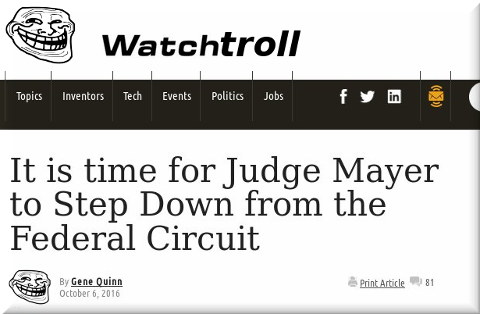
IN SIGHT or in view of the declining value of software patents in the US (no matter if the Patent and Trademark Office grants these), patent maximalists have already resorted to SCOTUS bashing, Patent Trial and Appeal Board (PTAB) bashing, and earlier this year Court of Appeals for the Federal Circuit (CAFC) bashing. It's pretty bad and it alienates judges. Imagine being Judge Mayer and then seeing this unfair headline from Watchtroll (after Mayer rejected/thwarted a software patents lawsuit of Intellectual Ventures):

"It's pretty bad and it alienates judges."Stephen Yelderman, a Professor of Law at the University of Notre Dame Law School, has meanwhile released this prior art analysis (based on measurable rates). Authored quite recently and dealing with 35 U.S.C. €§ 103, this relates to something we published earlier today. Dennis Crouch added (also regarding U.S.C. €§ 103): "One ongoing debate among patent attorneys is the proper abbreviation of the statutory phrases “person having ordinary skill in the art,” 35 U.S.C. 103, and “person skilled in the art,” 35 U.S.C. 112(a). [...] I prefer PHOSITA (Person Having Ordinary Skill In The Art) [...] The chart below shows that the PTAB’s favorite is POSITA with 68% of the cases having abbreviations. Still, most PTAB cases just spell out the rule without any abbreviation at all."
Kevin Noonan from Patent Docs has meanwhile dealt with the subject (35 U.S.C. ۤ 103) by saying that CAFC's Chief Judge Sharon Prost expressed "dismay over the number of patent cases coming to the Court." They should take it back to the lower court/tribunal, as they did in the following case (Tris Pharma, Inc. v. Actavis Laboratories FL, Inc.):
A certain amount of comment has recently been evinced from the patent bar by the voicing from several members of the Federal Circuit, including the Chief Judge, of their dismay over the number of patent cases coming to the Court. In particular, this increase in the patent case census in Court is due in not some small degree to the number of cases arising from decisions by the Patent Trial and Appeal Board (PTAB) that the Court is tasked with reviewing regarding the validity vel non of patents from the various post-grant review proceedings (the largest number of which arise from inter partes reviews, IPRs). Perhaps in reaction to its dismay, the Court in several cases has remanded PTAB decisions based on failure of the Board to properly support their decisions to be amenable to appellate review; see, for example, Securus Tech v. Global Tel*Link (Fed. Cir. 2017) (IPR2014-01278) (Pat. No. 7,860,222); Ultratec v. CaptionCall and Matal (Fed. Cir. 2017). This basis for eschewing review has been much more rare in district court appeals but arose last week in the Court's decision in Tris Pharma Inc. v. Actavis Laboratories FL, Inc.
[...]
The District Court found the asserted claims of U.S. Patent Nos. 8,465,765 ('765 patent), 8,563,033 ('033 patent), 8,778,390 ('390 patent), 8,956,649 ('649 patent), and 9,040,083 ('083 patent) were invalid as being obvious under 35 U.S.C. ۤ 103.
[...]
Based on all these deficiencies the Federal Circuit remanded to the District Court for "further fact-finding." Whether an increased frequency of these types of decisions based on Rule 52(a) in appeals from District Court opinions by a beleaguered Federal Circuit remains to be seen.
"So long story short, this court may be overworked."It then mentioned Chief Judge Sharon Prost's dissent in another case (covered the following day). "On Friday, November 16th," it said, "the Court of Appeals for the Federal Circuit issued a nonprecedential opinion in Amazon.com, Inc. v. ZitoVault, LLC, affirming a decision by the Patent Trial and Appeal Board (PTAB) that e-commerce giant Amazon failed to prove a patent owned by security solutions provider ZitoVault was unpatentable. The Federal Circuit majority of Circuit Judges Kara Stoll and Kathleen O’Malley disagreed with Amazon’s that the PTAB erred in its claim construction. Dissenting, Chief Judge Sharon Prost wrote that she believed the PTAB’s analysis of a specific claim term was flawed, and she would have vacated the PTAB decision and remanded the case for further consideration."
So long story short, this court may be overworked. It's a strain. Prost’s track record has been largely positive in our view and we hope she'll be strong enough to endure the heckling. ⬆